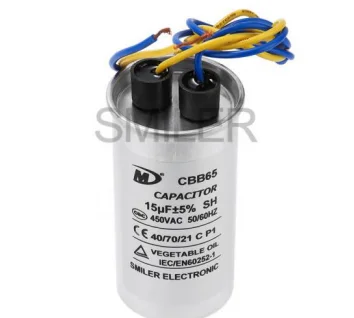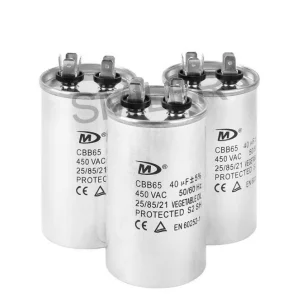Air conditioning capacitors are small but very significant parts that contribute directly to controlling the performance of your AC unit. The main function of capacitors is to hold and release energy to drive the air conditioning system's motors, for example, the compressor motors and fan motors. In the absence of capacitors, the motors would not be able to start or function properly.
There are different kinds of capacitors, including start capacitors and run capacitors with differences in their functions. Start capacitors give a one-time energy for starting up the motor, and run capacitors give a continuous supply to keep it running. Influencing this delicate balance is crucial for your air conditioner's optimal performance.
 The effectiveness of an air conditioning unit greatly relies on capacitors performance level determines how power the motors receive consistently, optimizing operations and lowering energy usage. For instance, the capacitors from SMILER can self-repair and maintain stable temperatures internally. These traits not only enhance lifespan but also decrease stress on other system components.
The effectiveness of an air conditioning unit greatly relies on capacitors performance level determines how power the motors receive consistently, optimizing operations and lowering energy usage. For instance, the capacitors from SMILER can self-repair and maintain stable temperatures internally. These traits not only enhance lifespan but also decrease stress on other system components.
In addition, SMILER also employ metallized polypropylene film and aluminum, casing for improving heat dispersion and stability. Medium includes metallized polypropylene film, shell consists of an aluminum shell package, internal potting involves oil filling. These developments ensure that the capacitor performs at its best under voltage fluctuations and adverse conditions.
Whenever a capacitor is failing or can't start properly, it may cause some of a number of questions in your air conditioner. Some of the usual signs include failure in starting the AC system, intermittent cooling operation or even total system failure. Furthermore, a malfunctioning capacitor can cause motors to overheat or operate less effectively, resulting in increased energy expenditure. Capacitor degradation is a concern caused by factors such as heat and frequent usage over time.
 The performance of an air conditioner, specifically its ability to cool, mostly depends on the health of its capacitor. When a capacitor is weak or failing, it fails to provide power to the fan and compressor motors, which results in reduced airflow and reduced cooling efficiency. A stable capacitor ensures the motors are running and can create the same temperature in your space consistently.
The performance of an air conditioner, specifically its ability to cool, mostly depends on the health of its capacitor. When a capacitor is weak or failing, it fails to provide power to the fan and compressor motors, which results in reduced airflow and reduced cooling efficiency. A stable capacitor ensures the motors are running and can create the same temperature in your space consistently.
For instance, there is SMILER’s CBB65 Capacitors, which are designed especially for air conditioners and come with in-built explosion mechanisms to offer secure and dependable operation. Lightweight capacitance levels remain consistent to ensure peak motor performance without any stress or strain.
Identifying signs of capacitor malfunction can help you avoid expensive repairs or replacements later on down the road with some typical cues being.
1. Humming noises from the AC unit.
2. Difficulty starting or frequent shutdowns.
3. Reduced cooling effectiveness.
4. Increased electricity bills.
5. Bulging or leaking capacitors.
If you observe any of these signs or indicators, one must deal with them immediately.
The lifespan and performance of your air conditioning system greatly rely on the quality of its parts. The capacitors quality is crucial here. A premium capacitor not only guarantees smooth functioning but also safeguards the systems vital components from excessive damage and degradation. SMILER produces capacitors with characteristics, including exceptional stability, self healing feature and increased lifespan. These characteristics tremendously minimize the likelihood of breakdowns as well as expensive maintenance processes.
Routine maintenance is vital to extend the life of your air conditioner capacitor. Regular checks should be done to identify any early signs of wear or wear and tear, and replace them as soon as possible to avoid extensive damage.
Maintenance of your capacitor entails dust and dirt cleaning from the device in order to prevent overheating, tightening of electrical connections, and examining whether it is bulging or leaking. Capacitors subject to heat or damp conditions may depreciate quicker.
SMILER's products undergo tested rigorously to withstand extreme conditions, including skewed humidity testing at 60°C relative humidity of 95%. Such endurance speaks to the worth of selecting capacitors designed for longevity.
SMILER capacitors are the best of technology and innovation. The precise production employs polypropylene film to provide the best quality stability and self-healing properties. A medium renown for delivering maximum lifespan and lower internal temperature fluctuations. This provides consistent capacitors that work amazingly well even under extreme conditions.
SMILER capacitors are also long-lasting and strong in performance under conditions, lasting for up to 30 thousand hours before they require maintenance or replacement. This extends the period between replacements and maintenance expenses, saving them a valuable and cost-saving solution for any air conditioning unit.
Besides, the SMILER products boast a design that enables them to function impeccably for extended periods under conditions of increased voltage (up to 10% above normal levels) and larger current flow (capable of supporting currents up to 30% above rated levels). The ability to function satisfactorily under conditions makes the products suitable for applications demanding constant performance and durability.
A: An AC capacitor is a highly critical electrical component in air conditioners employed to initiate and run the motors of the compressor and fan. It acts as a temporary battery, storing and releasing electric power to provide the required amount of power boost to these motors so that they can function efficiently.
A: Electrolytic capacitors are widely used in air conditioners to reduce disruptions of DC voltage which have been rectified by diodes. The process of rectification converts the AC voltage of the power supply into DC voltage.
A: Signs of a faulty AC power capacitor are that the AC will not turn on, hums, or operates part-time. You could also notice increased power usage or insufficient cooling.